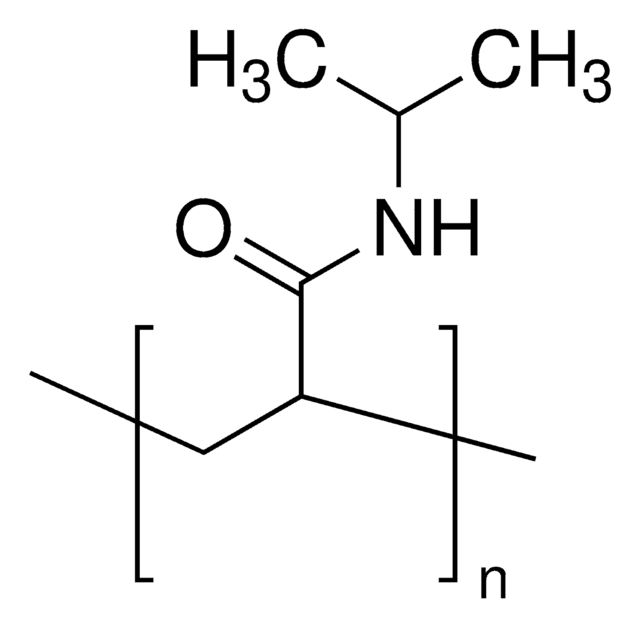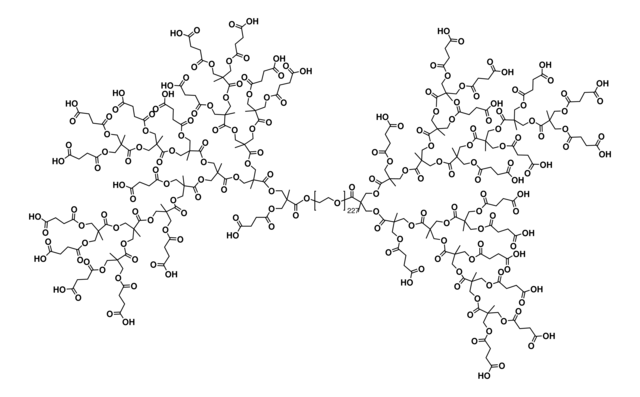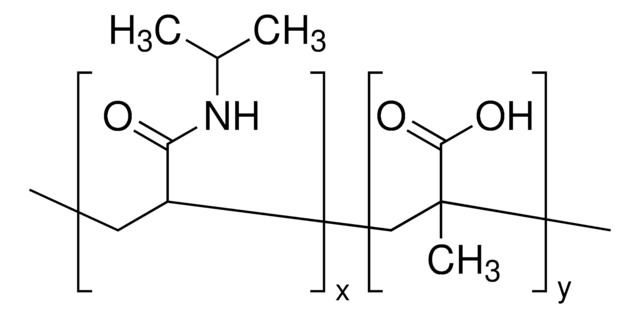901702
Carboxylic acid-poly(ethylene glycol)-b-poly(ε-caprolactone)
PEG average Mn 5000, PCL average Mn 5000
동의어(들):
Carboxylic acid PEG-PCL diblock copolymer, Carboxylic acid-PEG-PCL, PEG-b-PCL, PEG-PCL
로그인조직 및 계약 가격 보기
모든 사진(1)
About This Item
Linear Formula:
C6H11O3S[C2H4O]n[C6H10O2]mH
UNSPSC 코드:
12352106
NACRES:
NA.23
추천 제품
형태
powder or solid
분자량
PCL average Mn 5000
PEG average Mn 5000
색상
white to off-white
PDI
≤1.3 (by GPC)
배송 상태
dry ice
저장 온도
−20°C
애플리케이션
Carboxylic acid-poly(ethylene glycol)-b-poly(ε-caprolactone) is a functionalized, amphiphilic, diblock copolymer composed of a hydrophilic PEG block and a hydrophobic PCL block. These biodegradable, biocompatible polymers can self-assemble to form nanoparticles, such as micelles and polymersomes, in both aqueous and non-aqueous media. Due to these properties, these polymers are widely used in polymeric nanoparticle formulation to achieve controlled and targeted delivery of therapeutic agents (e.g. APIs, genetic material, peptides, vaccines, and antibiotics). Additionally, well-defined nanoparticles with tunable size and properties can be prepared by altering the molecular weight ratios between hydrophilic and hydrophobic blocks, as well as by controlling formulation parameters. The carboxylic acid functional group on the PEG chain enables rapid and facile surface functionalization, allowing for these materials to be used in applications such as targeted drug delivery.
Storage Class Code
11 - Combustible Solids
WGK
WGK 3
Flash Point (°F)
Not applicable
Flash Point (°C)
Not applicable
가장 최신 버전 중 하나를 선택하세요:
Jian Jin et al.
PloS one, 9(11), e112200-e112200 (2014-11-12)
In this content, a small molecular ligand of prostate specific membrane antigen (SMLP) conjugated poly (caprolactone) (PCL)-b-poly (ethylene glycol) (PEG) copolymers with different block lengths were synthesized to construct a satisfactory drug delivery system. Four different docetaxel-loaded polymeric micelles (DTX-PMs)
Cem Varan et al.
Beilstein journal of nanotechnology, 8, 1446-1456 (2017-09-14)
Background: Brain tumors are the most common tumors among adolescents. Although some chemotherapeutics are known to be effective against brain tumors based on cell culture studies, the same effect is not observed in clinical trials. For this reason, the development
문서
Professor Nicola Tirelli (Istituto Italiano di Tecnologia, Italy) highlights the microfluidic-assisted method for fabricating well-defined and reproducible nanoparticles for drug delivery research.
Professor Nicola Tirelli (Istituto Italiano di Tecnologia, Italy) highlights the microfluidic-assisted method for fabricating well-defined and reproducible nanoparticles for drug delivery research.
자사의 과학자팀은 생명 과학, 재료 과학, 화학 합성, 크로마토그래피, 분석 및 기타 많은 영역을 포함한 모든 과학 분야에 경험이 있습니다..
고객지원팀으로 연락바랍니다.







